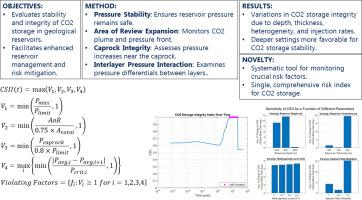Advancing CO₂ sequestration integrity: Development and application of the CO₂ storage integrity index in diverse geological and operational settings
IF 9.5
Q1 ENERGY & FUELS
引用次数: 0
Abstract
This study introduces the CO₂ Storage Integrity Index (CSII), an integrated operational framework developed to evaluate the stability and integrity of CO₂ storage within geological reservoirs over time. The CSII integrates crucial risk factors, such as pressure stability, area of review expansion, caprock integrity, and interlayer pressure interactions, offering a robust framework for assessing risks and ensuring regulatory compliance in CO₂ sequestration projects. While CSII consolidates existing monitoring parameters rather than providing new fundamental insights, it addresses the operational need for real-time integrated risk assessment in commercial CCS projects. Through detailed numerical simulations, the dynamic responses of CO₂ storage to various geological and operational parameters are examined, highlighting the critical influence of factors such as reservoir depth, thickness, geological heterogeneity, and injection rates on storage integrity.
Key findings from the application of the CSII reveal that shallow reservoirs (∼800 m) are more prone to higher CSII values and greater sensitivity to changes, resulting in increased risks due to lower pressures and higher buoyancy forces. In contrast, deeper reservoirs (∼3000 m) show more stable conditions, maintaining CO₂ in a supercritical state, which minimizes risks. Thicker reservoirs (∼300 m) exhibit higher variability and sensitivity in CSII, presenting challenges in managing injection pressures, while higher injection rates further exacerbate these dynamics in shallow to mid-depth reservoirs.
While the current study focuses on core risk factors, the proposed extension of the CSII to include additional factors impacting CO₂ storage risk, such as Joule-Thomson cooling, geomechanical risks, thermo-mechanical risks to caprock, dry-out phenomena, and integrity of wells, is discussed as a potential enhancement for future analyses. These factors will further improve the ability of CSII to comprehensively assess the risks in CO₂ storage projects.
The CO₂ Storage Integrity Index (CSII) provides a valuable tool for developing tailored injection strategies based on reservoir-specific characteristics, ensuring safer and more reliable CO₂ sequestration. This framework significantly contributes to the effective risk management of geological storage, supporting the broader implementation of carbon capture and storage (CCS) as a critical technology for achieving net-zero emissions.

推进二氧化碳封存完整性:不同地质和操作环境下二氧化碳封存完整性指数的开发与应用
本次研究引入了为评价地质水库内CO₂储存的稳定性和完整性而开发的综合操作框架“CO₂储存完整性指数(CSII)”。CSII整合了关键的风险因素,如压力稳定性、审查面积扩大、盖层完整性和层间压力相互作用,为评估风险和确保二氧化碳封存项目的法规遵从性提供了一个强大的框架。虽然CSII整合了现有的监测参数,而不是提供新的基本见解,但它解决了商业CCS项目中实时综合风险评估的操作需求。通过详细的数值模拟,考察了CO 2储存量对各种地质和操作参数的动态响应,突出了储层深度、厚度、地质非均质性和注入速度等因素对储存量完整性的关键影响。应用CSII的主要发现表明,浅层油藏(~ 800 m)更容易出现较高的CSII值,对变化更敏感,由于压力较低和浮力较大,导致风险增加。相比之下,较深的储层(~ 3000米)表现出更稳定的条件,将CO₂保持在超临界状态,从而将风险降至最低。较厚的储层(~ 300米)CSII表现出更高的变异性和敏感性,这给注入压力管理带来了挑战,而较高的注入速率进一步加剧了浅层至中深层储层的这些动态。虽然目前的研究主要集中在岩心风险因素上,但CSII的拟议扩展将包括影响CO₂储存风险的其他因素,如焦耳-汤姆森冷却、地质力学风险、盖层热力学风险、干涸现象和井的完整性,作为未来分析的潜在增强。这些因素将进一步提高CSII综合评估CO₂储存项目风险的能力。CO₂储存完整性指数(CSII)提供了一个有价值的工具,可以根据油藏的特定特征制定量身定制的注入策略,确保更安全、更可靠的CO₂封存。该框架极大地促进了地质封存的有效风险管理,支持碳捕获与封存(CCS)作为实现净零排放的关键技术的更广泛实施。
本文章由计算机程序翻译,如有差异,请以英文原文为准。
求助全文
约1分钟内获得全文
求助全文
来源期刊

Energy nexus
Energy (General), Ecological Modelling, Renewable Energy, Sustainability and the Environment, Water Science and Technology, Agricultural and Biological Sciences (General)
CiteScore
7.70
自引率
0.00%
发文量
0
审稿时长
109 days
 求助内容:
求助内容: 应助结果提醒方式:
应助结果提醒方式:


